*NURSING > QUESTIONS & ANSWERS > Mental Health Practice Questions. Last minute Exam Preparation. Answers and the Rationale. (All)
Mental Health Practice Questions. Last minute Exam Preparation. Answers and the Rationale.
Document Content and Description Below
Mental Health Practice Questions 1. A nurse is providing teaching to a client who has generalized anxiety disorder and a new prescription for venlafaxine. Which of the following statements should the ... nurse make? a. “This medication is only for short-term use.” b. “This medication can be taken on an as needed basis.” c. “This medication will effectively reduce your physical manifestations of anxiety.” d. “This medication should not be stopped abruptly.” 2. A nurse is teaching a client who has major depressive disorder and is scheduled to begin electroconvulsive therapy (ECT). Which of the following of information should the nurse include? a. “If you’re taking a benzodiazepine medication, you should take it before the procedure.” b. “You can expect to wake up about 15 minutes after the procedure.” c. “After the first procedure, you should expect to have ECT sessions monthly for a year.” d. “ECT is the primary treatment for most clients who have depression.” 3. A nurse is caring for a client who has schizophrenia and is experiencing negative symptoms. Which of the following manifestations should the nurse expect? a. Hallucinations b. Impaired memory c. Dysphoria d. Social discomfort 4. A nurse is caring for a client with schizophrenia who has been taking chlorpromazine for the past 2 months. Which of the following findings demonstrates that the chlorpromazine has been effective? a. The client reports that hallucinations occur less frequently b. The client sleeps uninterrupted for 6 hr each night c. The client reports that she is the “most important person on the unit” d. The client demonstrates stereotyped behaviors 5. A nurse is assessing a client who experienced a sexual assault 6 months ago. Which of the following findings should the nurse report to the provider as an indication of rape-trauma syndrome? a. Flat affect b. Refusal to accept help from others c. Report of intense guilt d. Denial of the sexual assault 6. A nurse is working with a client who exhibits extreme superstition, elaborate speech patterns, and eccentric behavior. The nurse should identify these features as which of the following personality disorders? a. Paranoid b. Histrionic c. Antisocial d. Schizotypal 7. A nurse is assessing a client who is taking lithium to treat bipolar disorder and has a lithium level of 2.2 mEq/L. Which of the following findings should the nurse expect? a. Muscle weakness b. Oliguria c. Vomiting d. Blurry vision 8. A nurse is assessing a client who is taking buspirone to treat generalized anxiety disorder. Which of the following findings should the nurse identify as an adverse effect of this medication? a. Arthralgia (joint pain) b. Photophobia (sensitivity to light) c. Xerostomia d. Bradycardia 9. A nurse is assessing a client who has a history of alcohol use disorder and is experiencing alcohol withdrawal. Which of the following findings should the nurse identify as manifestations of severe alcohol withdrawal? a. Decreased appetite b. Slurred speech c. Insomnia d. Hallucinations 10. A nurse is caring for a client who has alcohol use disorder. Following alcohol withdrawal, which of the following medications should the nurse expect to administer to the client during maintenance? a. Methadone b. Disulfiram c. Chlordiazepoxide d. Naloxone 11. A nurse on an important mental health unit is attending an interdisciplinary treatment team meeting for a client who has bipolar disorder with rapid cycling. The client is being prepared for discharge following his fourth admission in the last year. Which of the following referrals should the nurse make for the client first? a. Assertive community treatment b. Support group c. Private counseling d. Vocational rehabilitation services 12. A nurse in the emergency department is assessing a client who has generalized anxiety disorder. Which of the following actions should the nurse take first? a. Instruct the client to use guided imagery b. Move the client to a quiet area c. Assist the client in identifying his coping skills d. Allow the client time to express his feelings 13. A nurse is admitting a client who has derealization disorder. Which of the following manifestations should the nurse expect? a. The inability to recall important personal information b. The feeling that the surroundings are unreal c. The inability to recall identity d. The presence of at least 2 distinct personalities 14. A nurse is assessing a school-aged child who has ADHD and has been taking desipramine. Which of the following adverse effects should the nurse expect the child’s parent to report? a. Hyperactivity b. Depression c. Diarrhea d. Sedation 15. A nurse is caring for a client who has dementia. Which of the following findings should the nurse expect? a. Altered level of consciousness b. Impaired judgment c. Rapid change in personality d. Disturbances in perception 16. A nurse is caring for a client who has Wernicke-Korsakoff syndrome due to alcohol use disorder. Which of the following findings should the nurse expect? a. Increased arousal b. Arrhythmias c. Confusion d. Esophageal pain 17. A nurse is collecting data from a client with schizophrenia who was recently admitted to acute care. Which of the following findings should the nurse expect? a. Seductive behaviors b. Obsession with rituals c. Uncontrolled appetite d. Associative looseness 18. A nurse is teaching a client who has depression and is scheduled for transcranial magnetic stimulation (TMS). The nurse should inform the client that TMS can cause which of the following adverse effects? a. Retrograde amnesia b. Seizures c. Confusion d. Suicidal ideation Rationale: B. Although uncommon, seizures are potential adverse effect of TMS. Retrograde amnesia and confusion are adverse effects of electroconvulsive therapy. 19. A nurse is providing teaching to the parent of a school-aged child who has ADHD and a new prescription for methylphenidate IR. Which of the following pieces of information should the nurse provide? a. “Have your child take the medication once daily.” b. “This medication might make your child gain weight.” c. “Your child’s growth might slow while using this medication.” d. “Avoid giving your child food when taking this medication.” 20. A nurse is obtaining a client’s medical history prior to scheduling the client for electroconvulsive therapy (ECT). Which of the following findings should the nurse identify as a potential complication of the procedure? a. Severe depression b. Cardiac arrhythmia c. Bipolar disorder d. Parkinson’s disease 21. A nurse in a substance use disorder treatment facility is reviewing the medication records of a group of clients. The nurse should expect to administer methadone for a client who has a substance use disorder for which of the following substances? a. Amphetamines b. Opiates c. Barbiturates d. Hallucinogens 22. A nurse is teaching the family of a client who has Alzheimer’s disease about donepezil. Which of the following statements should the nurse include in the teaching? a. Donepezil can improve cognitive functioning during the earlier stages of the disease. b. Donepezil cures the disease process if started at the first recognition of dementia. c. Donepezil provides long-term reversal of memory loss in the last phase of the disease. d. Donepezil accelerated the breakdown of acetylcholine within the client’s brain. 23. A nurse is caring for a client with alcohol use disorder who has undergone detoxification. Which of the following medications should the nurse expect the provider to prescribe to assist the client with maintain sobriety? a. Varenicline b. Clonidine c. Buprenorphine d. Disulfiram 24. A nurse in an emergency department is assessing a client who has bipolar disorder and is in a manic state. Which of the following findings is the highest priority? a. The client reports sleeping 2 to 3 hours per night b. The client speaks to the nurse in a demanding tone c. The client reports not attending group therapy d. The client reports not taking medication for the past 2 weeks 25. A nurse is assessing a client prior to administering lithium. The client began taking lithium 1 week ago for the treatment of mania. For which of the following findings should the nurse withhold the dose? a. Report of nausea with frequent episodes of emesis b. Weight gain of 1.8 kg (4lb) since the start of treatment c. Fine hand tremors in both hands d. Serum lithium level of 1.1 mEq/L 26. A nurse on a mental health unit is caring for a client who begins throwing objects at other clients. Which of the following actions is the priority nursing intervention? a. Attempt to restrain the client’s arms b. Administer an anti-anxiety medication c. Place the client in seclusion d. Tell the client to stop the behavior 27. A nurse is preparing to care for a client who was brought to a community health facility by her caregiver, who states that the client refuses to eat. The nurse notes the client has lost weight, avoids making eye contact, and defers questions to the caregiver. Which of the following actions should the nurse take? a. Make sure the caregiver is present when interviewing the client b. Document how the caregiver responds when told that the client looks neglected c. Ask the client why she refuses to eat the caregiver’s food d. Identify sources of stress for the caregiver 28. A nurse is helping a client who has an anxiety disorder select a nonpharmacological stress-reduction therapy for home use. Which of the following therapies engages the insular cortex of the brain to allow the client to focus on a single thought that is important to the client in the present moment? a. Guided imagery b. Progressive relaxation c. Cognitive reframing d. Mindfulness 29. A nurse is observing a client with schizophrenia in the dayroom. Another client asks him if several items of clothing match. He replies “A match. I like matches. They are the givers of light, the light of the world. Let your light shine on.” The nurse should identify these statements as which of the following speech alterations? a. Clang association b. Echolalia c. Word salad d. Associative looseness 30. A nurse is caring for a client who has excoriation disorder. Which of the following statements by the client should the nurse expect? a. “I pick my face when I am nervous.” b. “I have bald patches from pulling out my hair.” c. “I inspect my body in the mirror several times a day.” d. “I am unable to part with any of my belongings.” 31. A nurse is assessing a client who has Stage 4 Alzheimer’s disease. Which of the following findings should the nurse expect? a. The client requires assistance with eating b. The client independently manages personal finances c. The client has bladder incontinence d. The client is able to identify the names of family members 32. A nurse is caring for a client with ADHD who has recently started taking lithium. For which of the following findings should the nurse monitor when evaluating the effectiveness of the medication? a. Increased attention span b. Decreased anxiety c. Reduced aggression d. Weight loss 33. A nurse is planning care for a client who has completed detoxification from opioid abuse disorder. The nurse should plan to teach about which of the following medications? a. Methadone b. Naltrexone c. Buprenorphine d. Disulfiram 34. A nurse is assessing a client who has anorexia nervosa. The nurse should expect the client to display which of the following characteristics? a. Refuses to participate in physical exercise activities b. Possesses feelings of decreased self-worth c. Preoccupied with concerns about personal health d. Avoids discussion of food 35. A nurse is assessing a client who is experiencing moderate level anxiety. Which of the following findings should the nurse expect? a. The client has a heightened perceptual field b. The client has difficulty concentrating c. The client reports shortness of breath d. The client reports a sense of impending doom 36. A nurse is performing a mental status assessment on an older adult client who has dementia. Which of the following questions should the nurse ask to assess the client’s remote memory? a. “What year did you graduate from high school?” b. “What is your favorite childhood memory?” c. “What did you have for supper yesterday?” d. “What is today’s date?” 37. A nurse is planning reminiscence therapy for an older adult client. The nurse should identify which of the following goals for the client’s therapy? a. The client will gain increased self-esteem b. The client will maintain orientation to place and time c. The client will independently perform ADLs d. The client will achieve optimal sensory stimulation [Show More]
Last updated: 1 year ago
Preview 1 out of 15 pages

Reviews( 0 )
Document information
Connected school, study & course
About the document
Uploaded On
Nov 27, 2020
Number of pages
15
Written in
Additional information
This document has been written for:
Uploaded
Nov 27, 2020
Downloads
0
Views
30

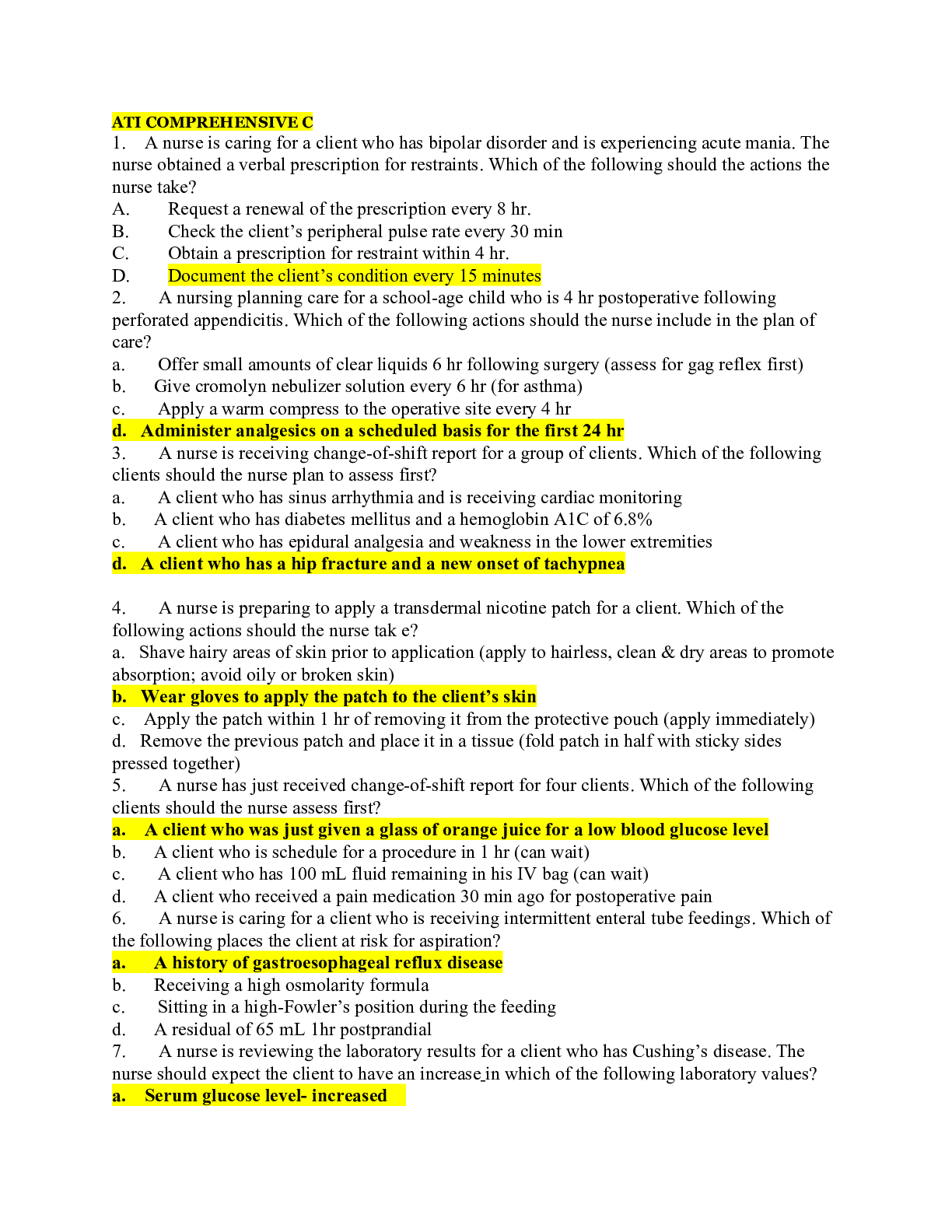
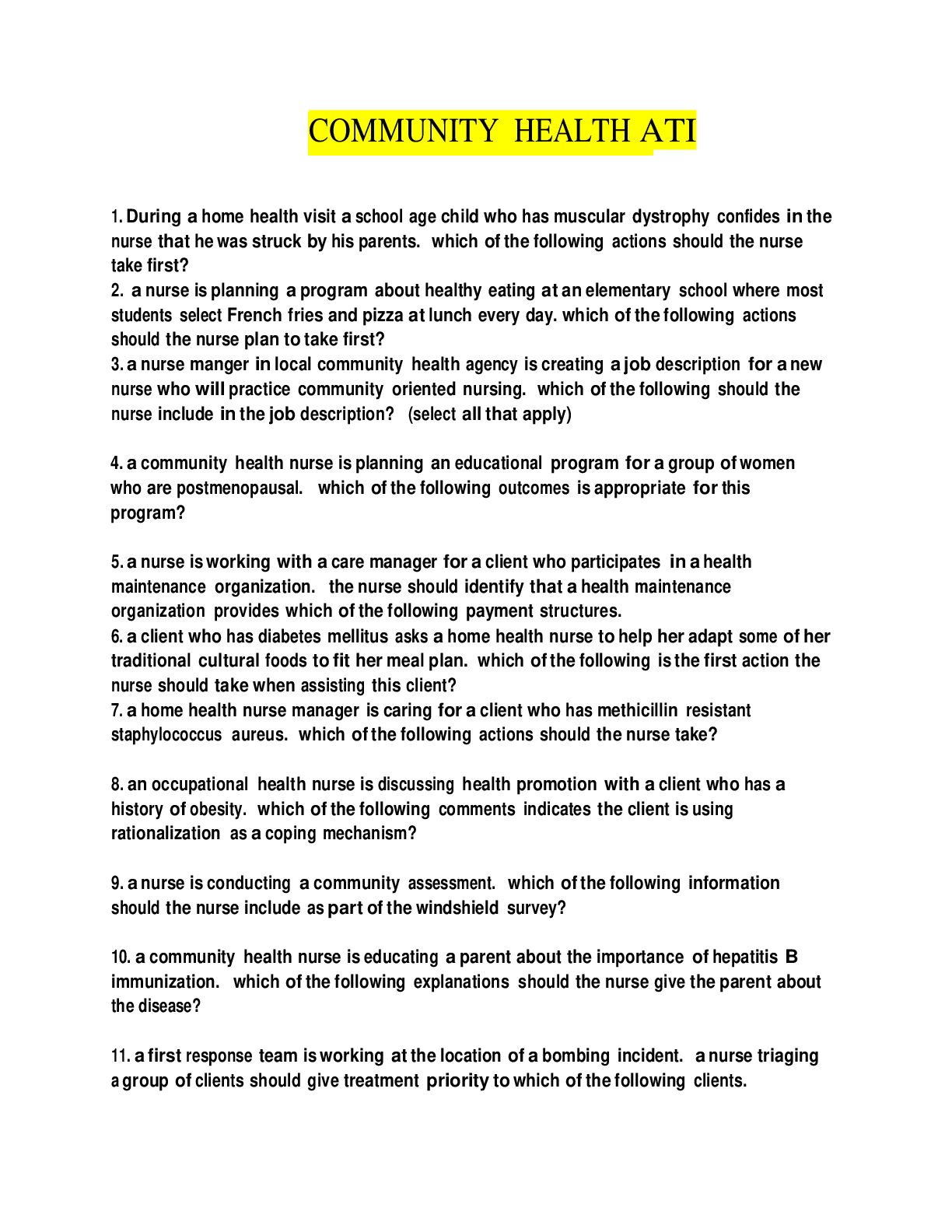
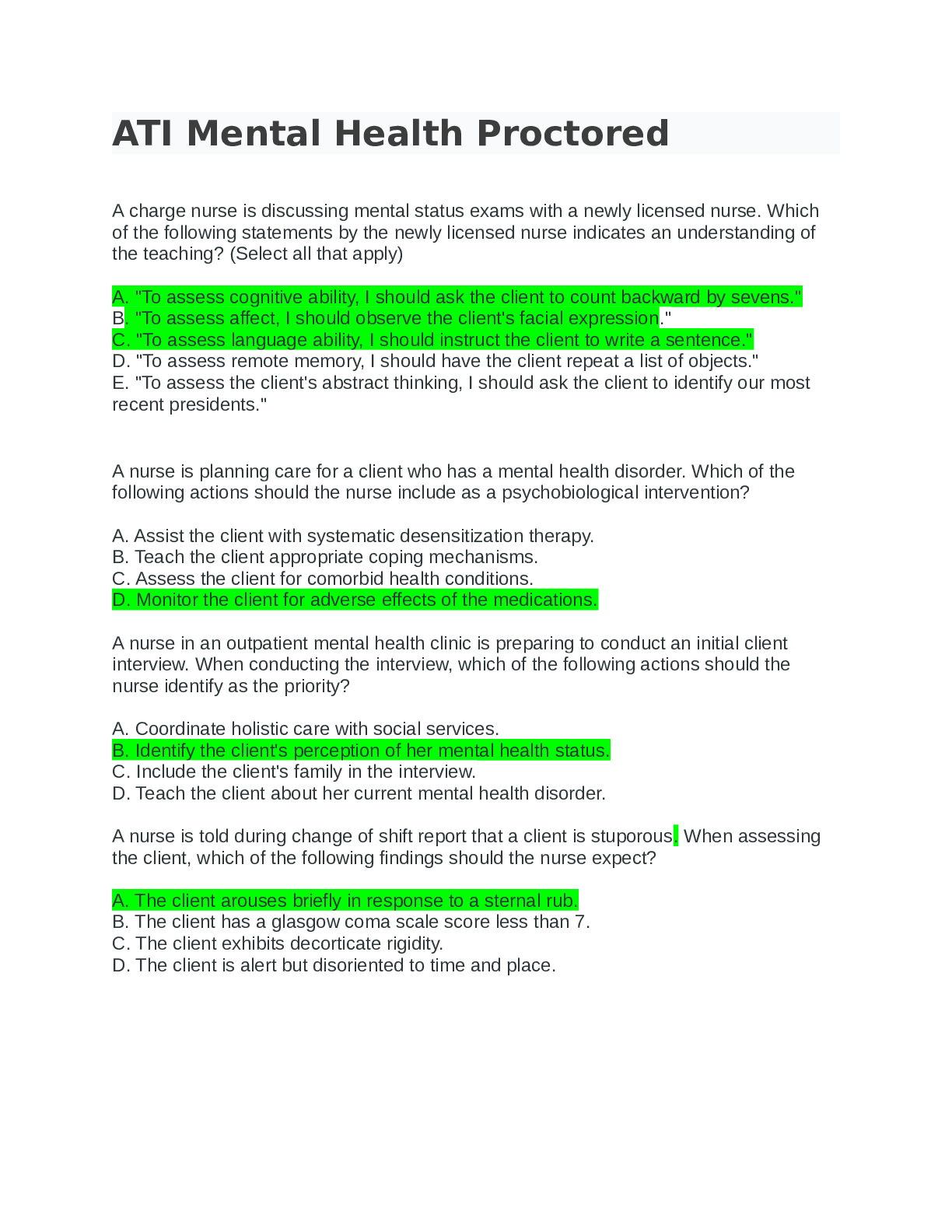
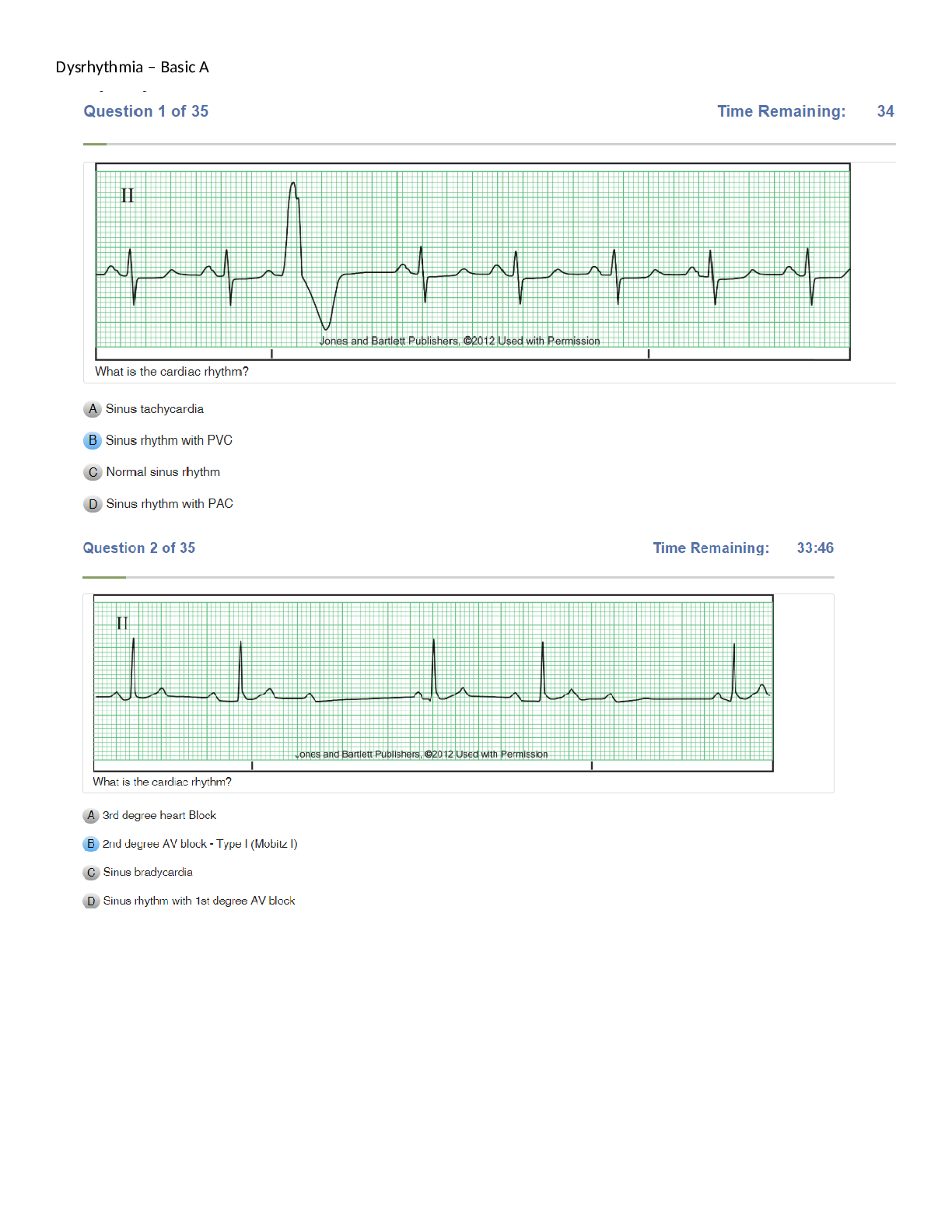
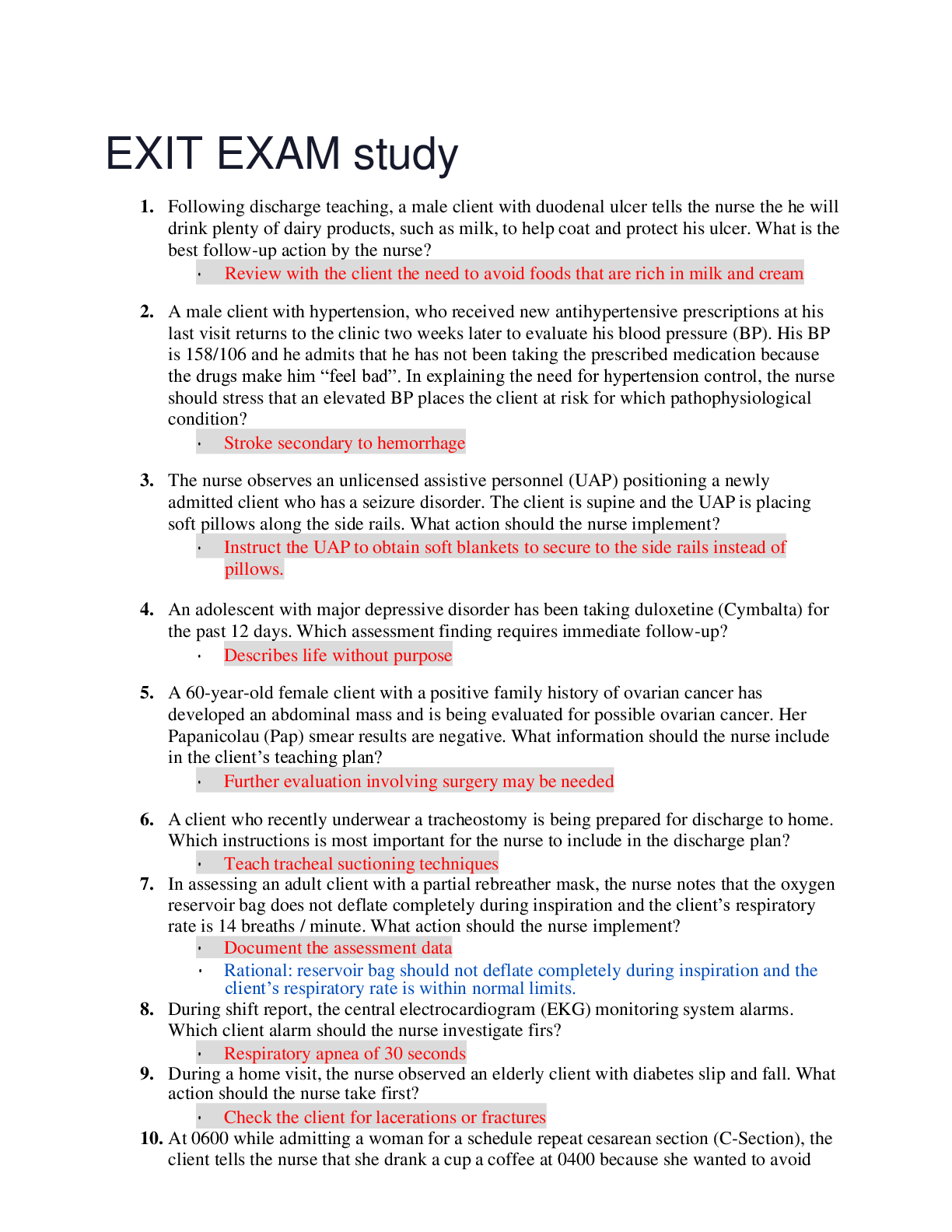
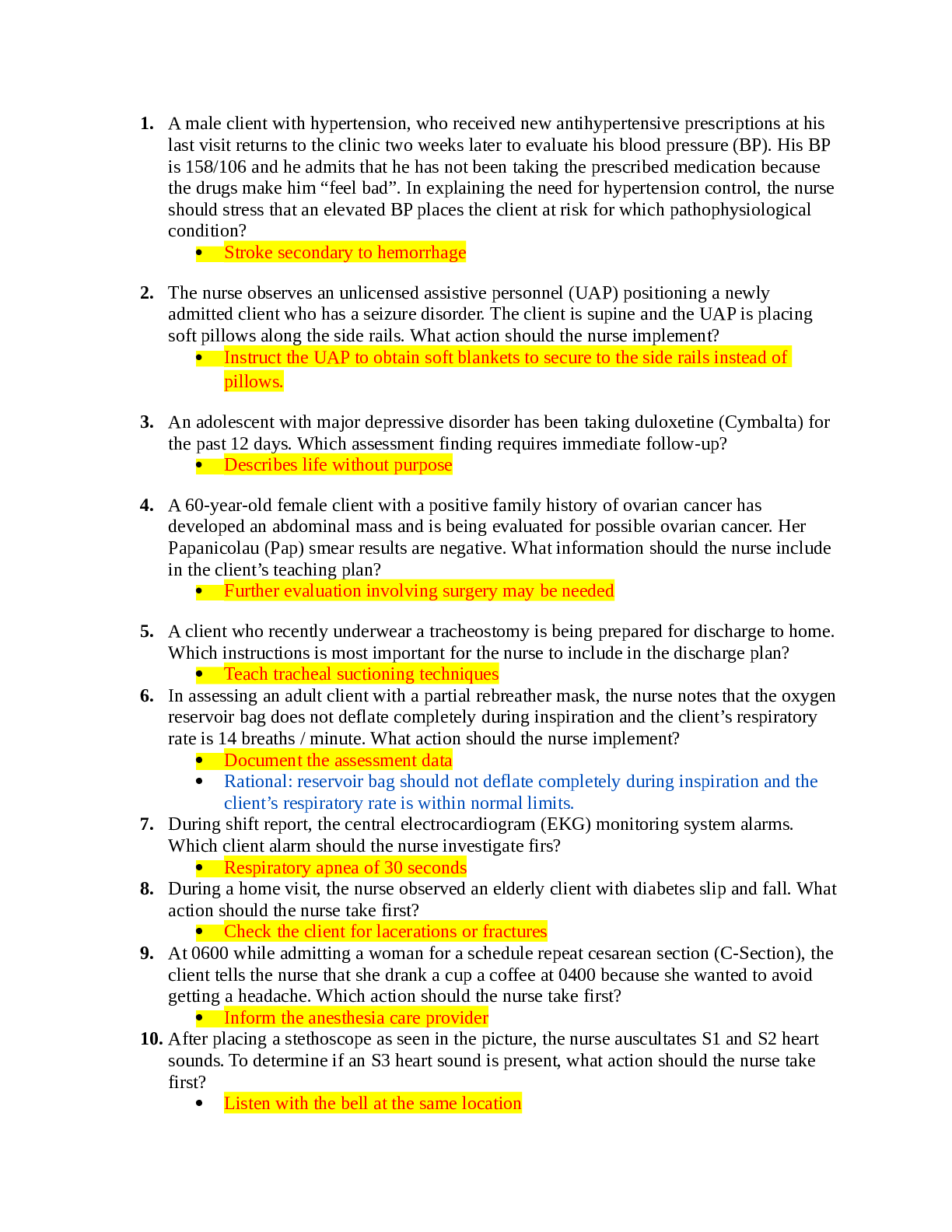

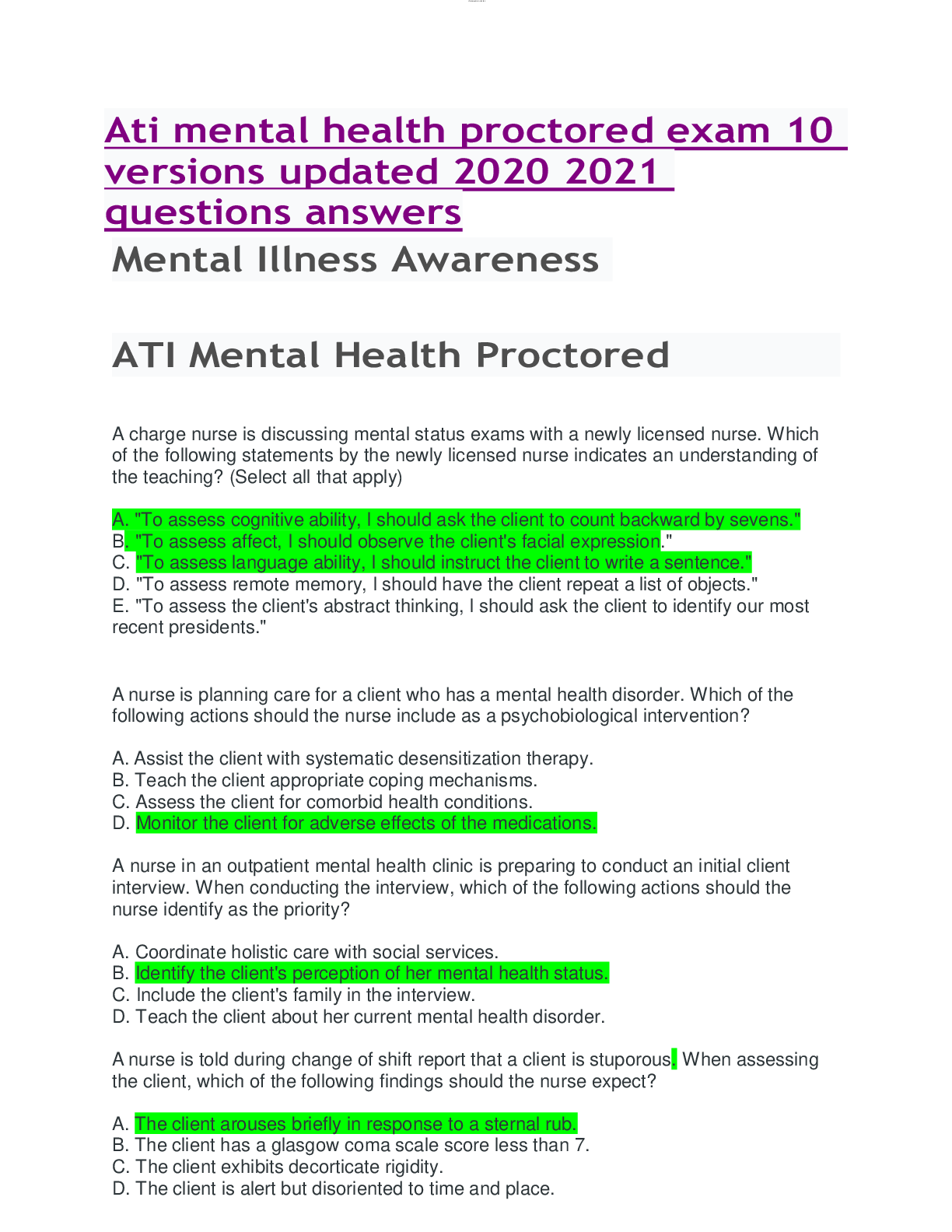
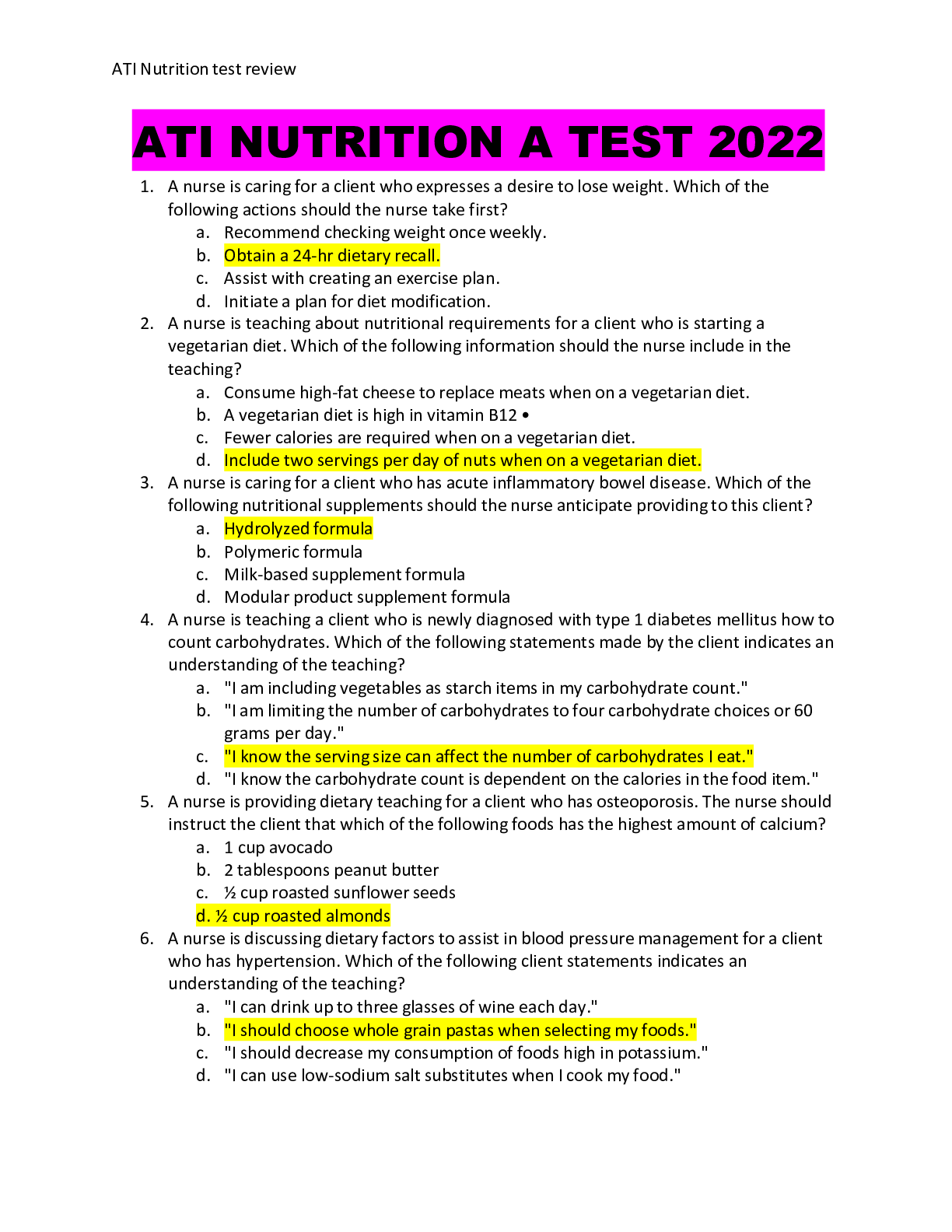
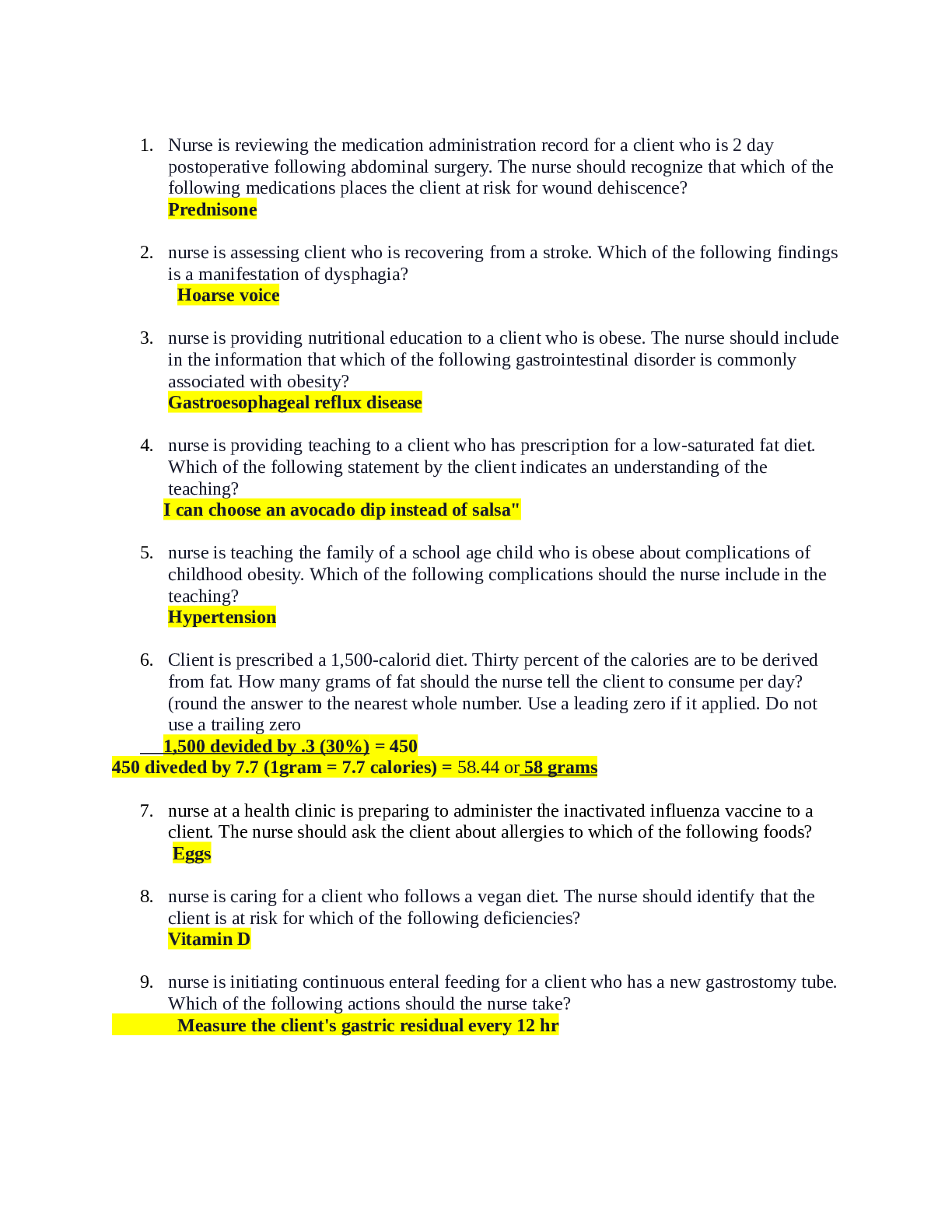

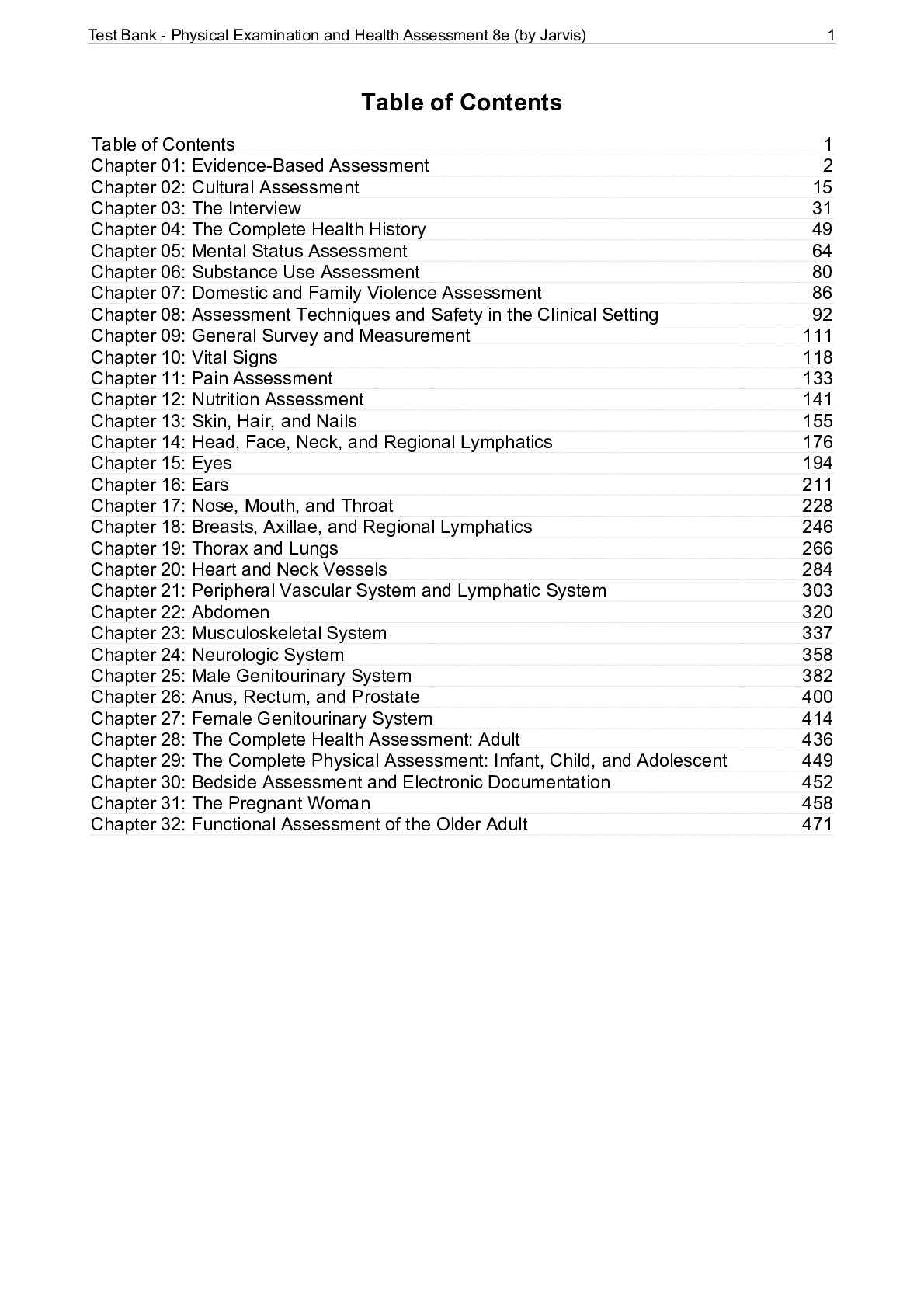
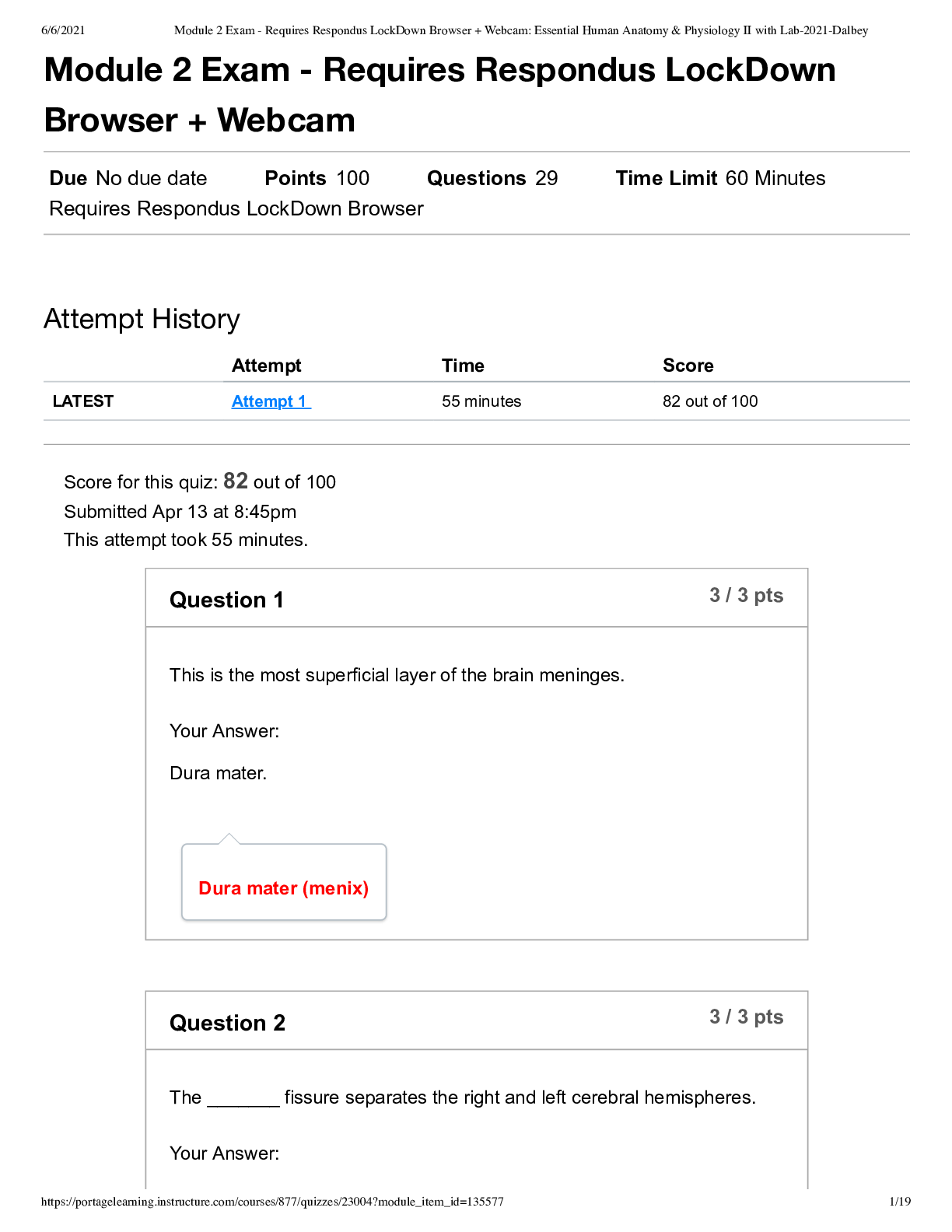
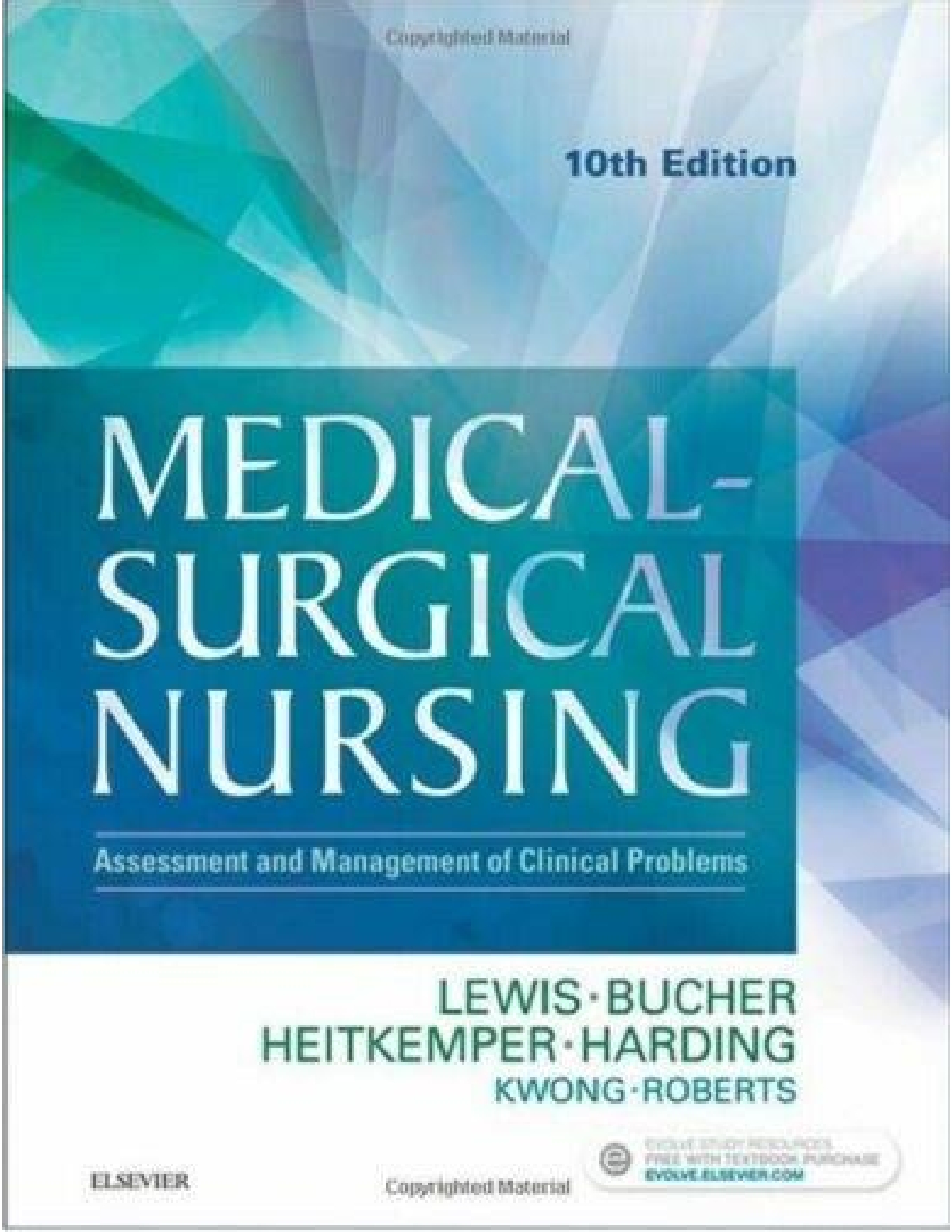
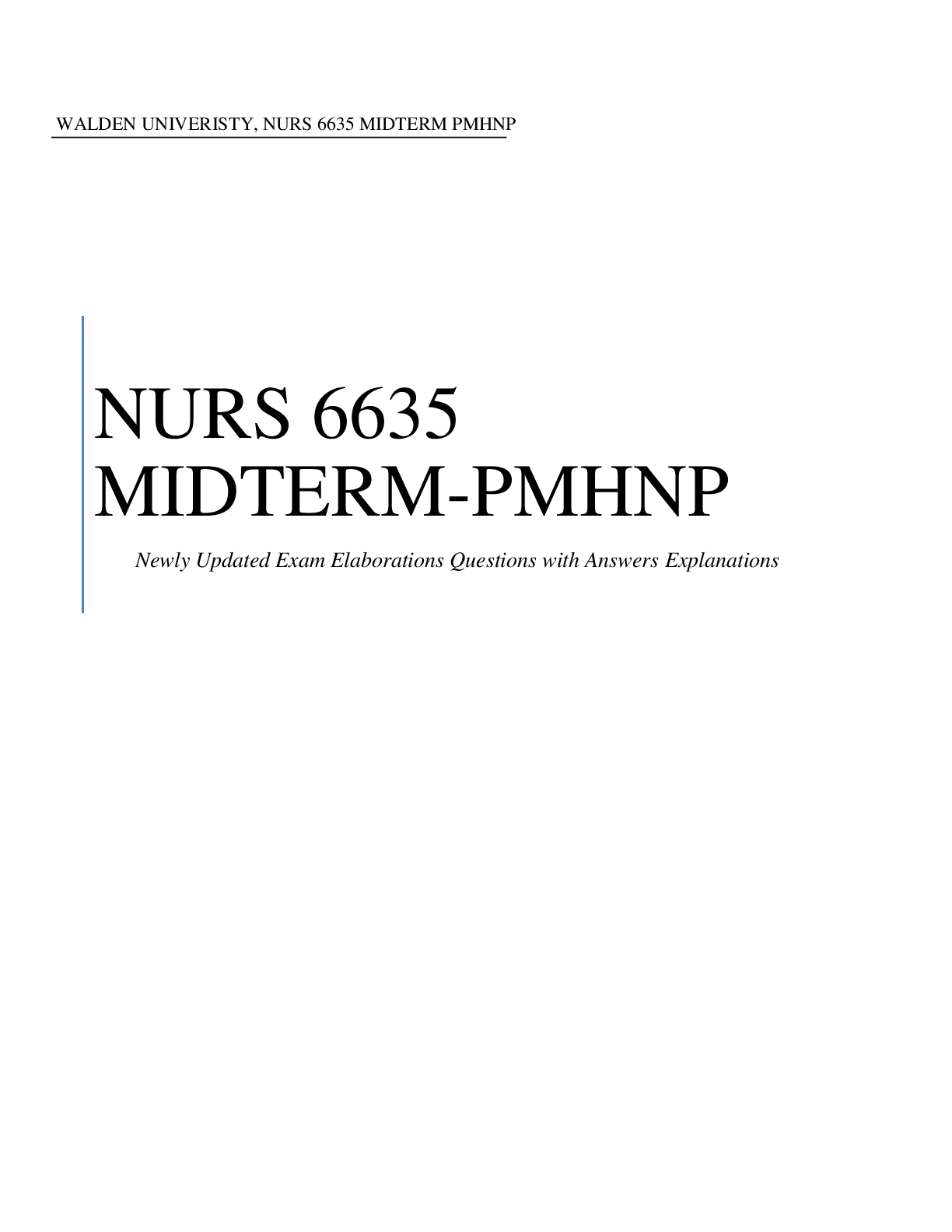
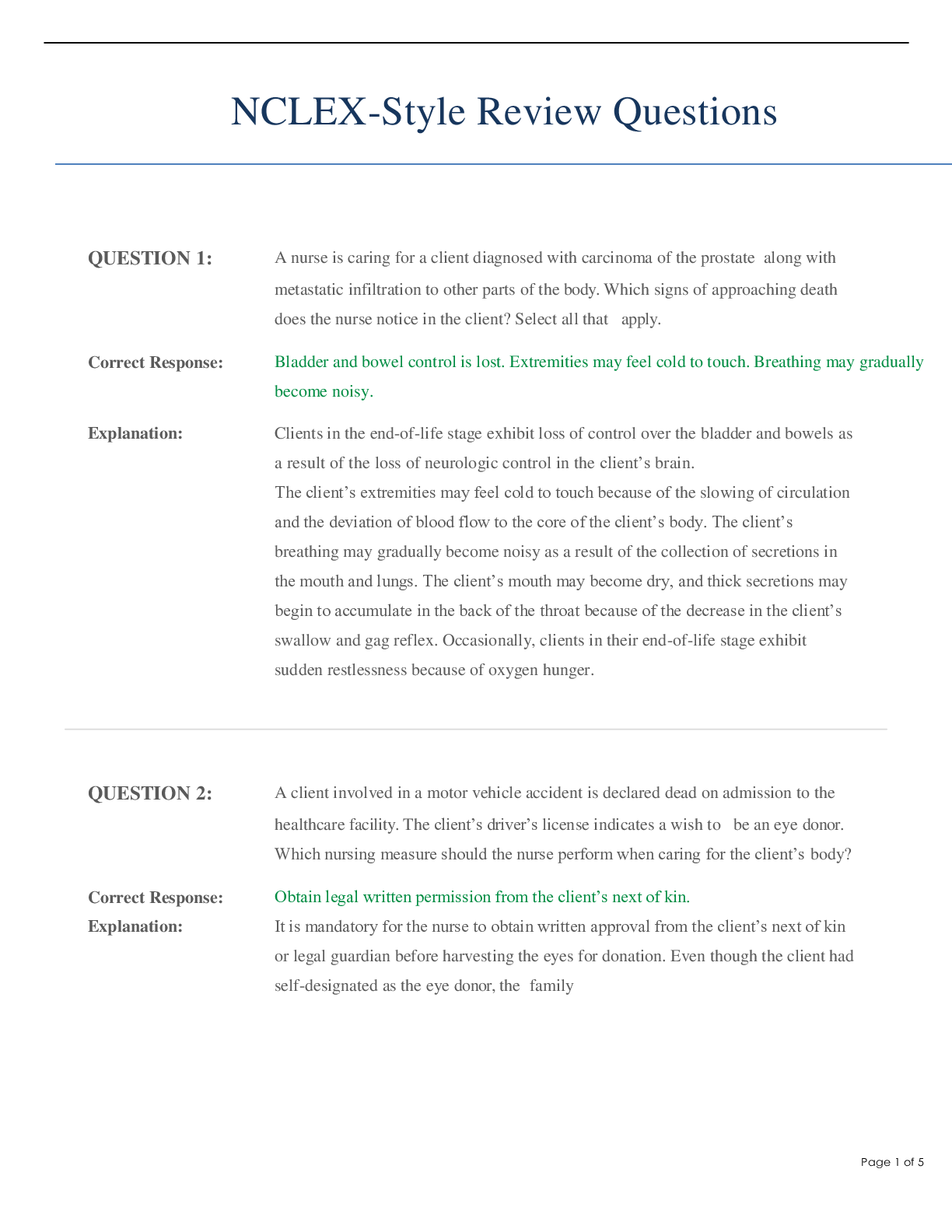
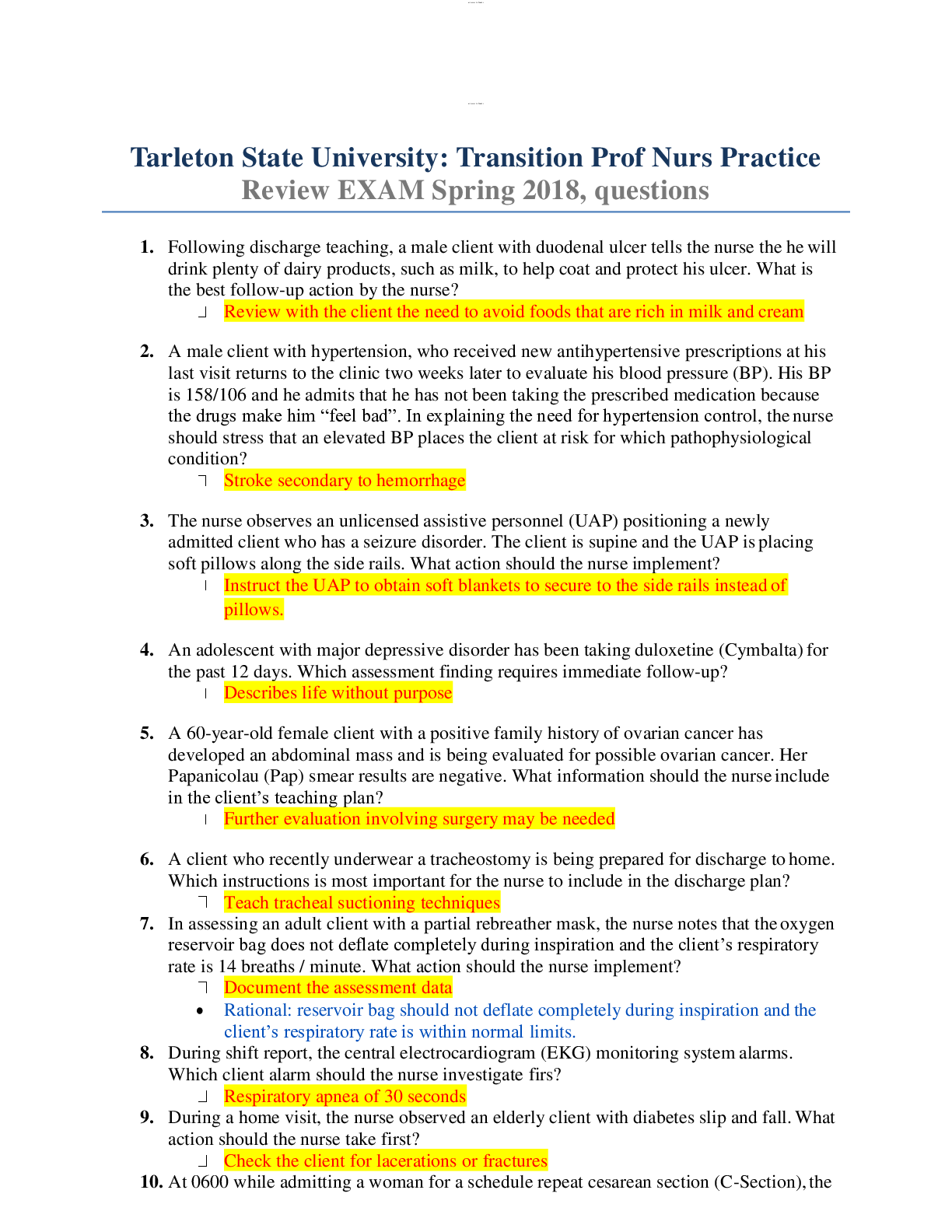
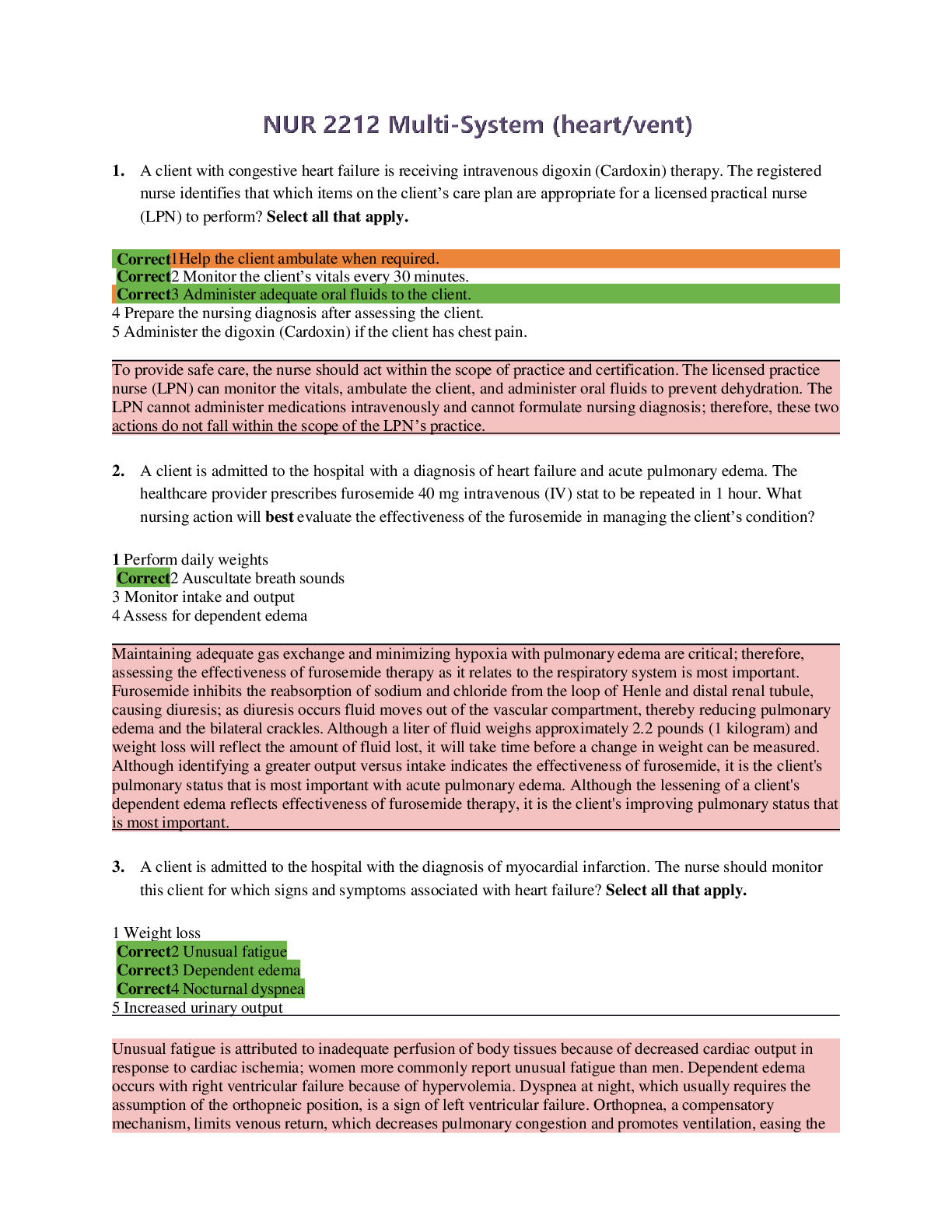

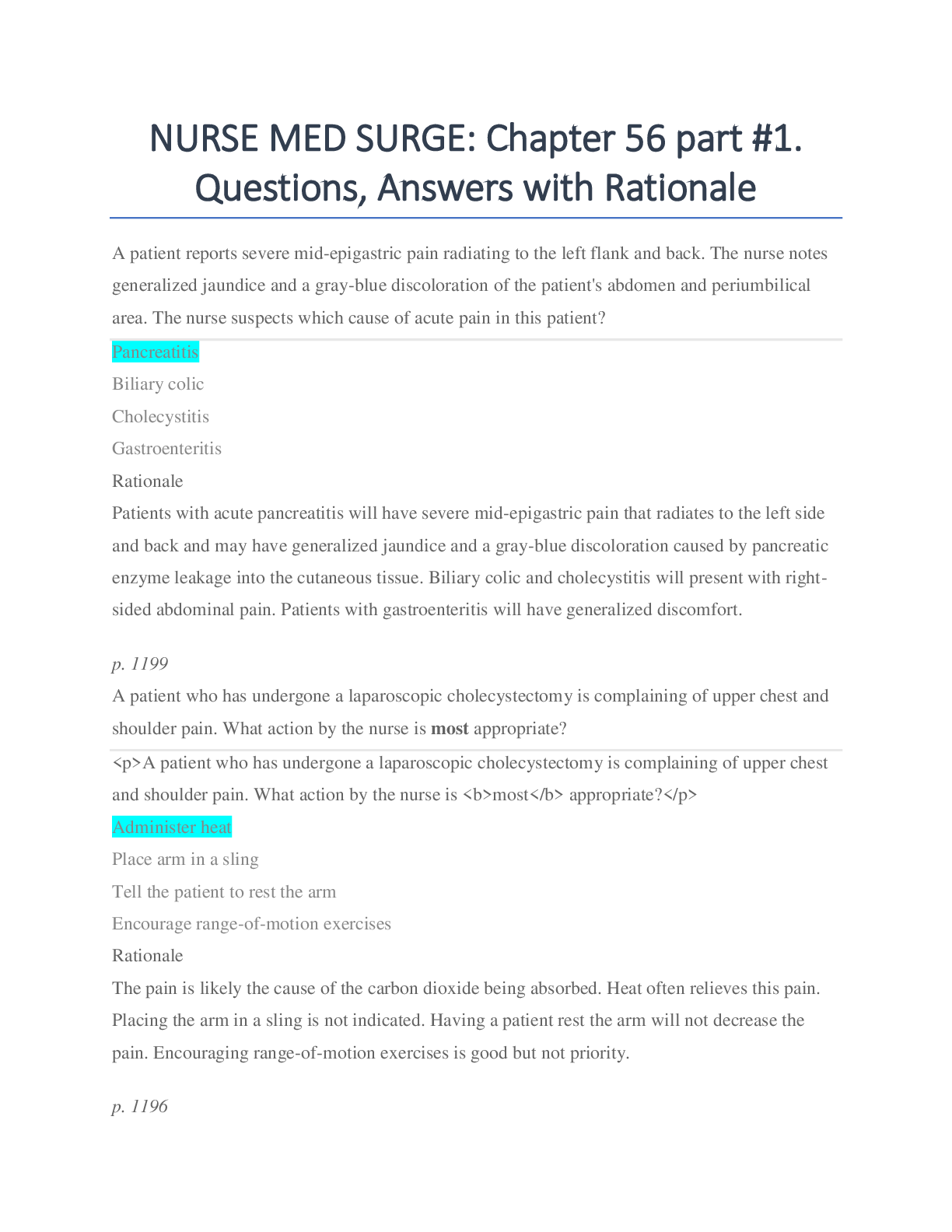
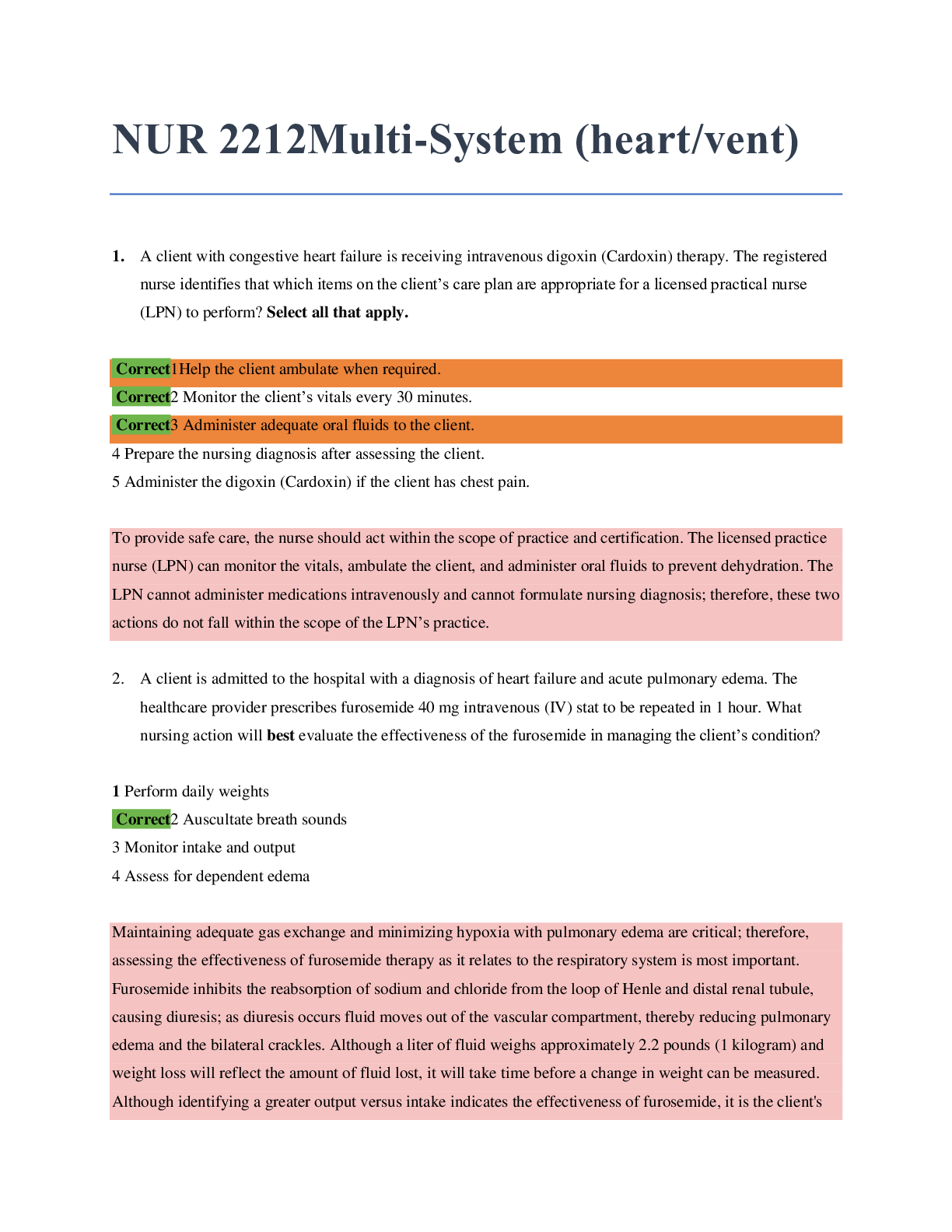
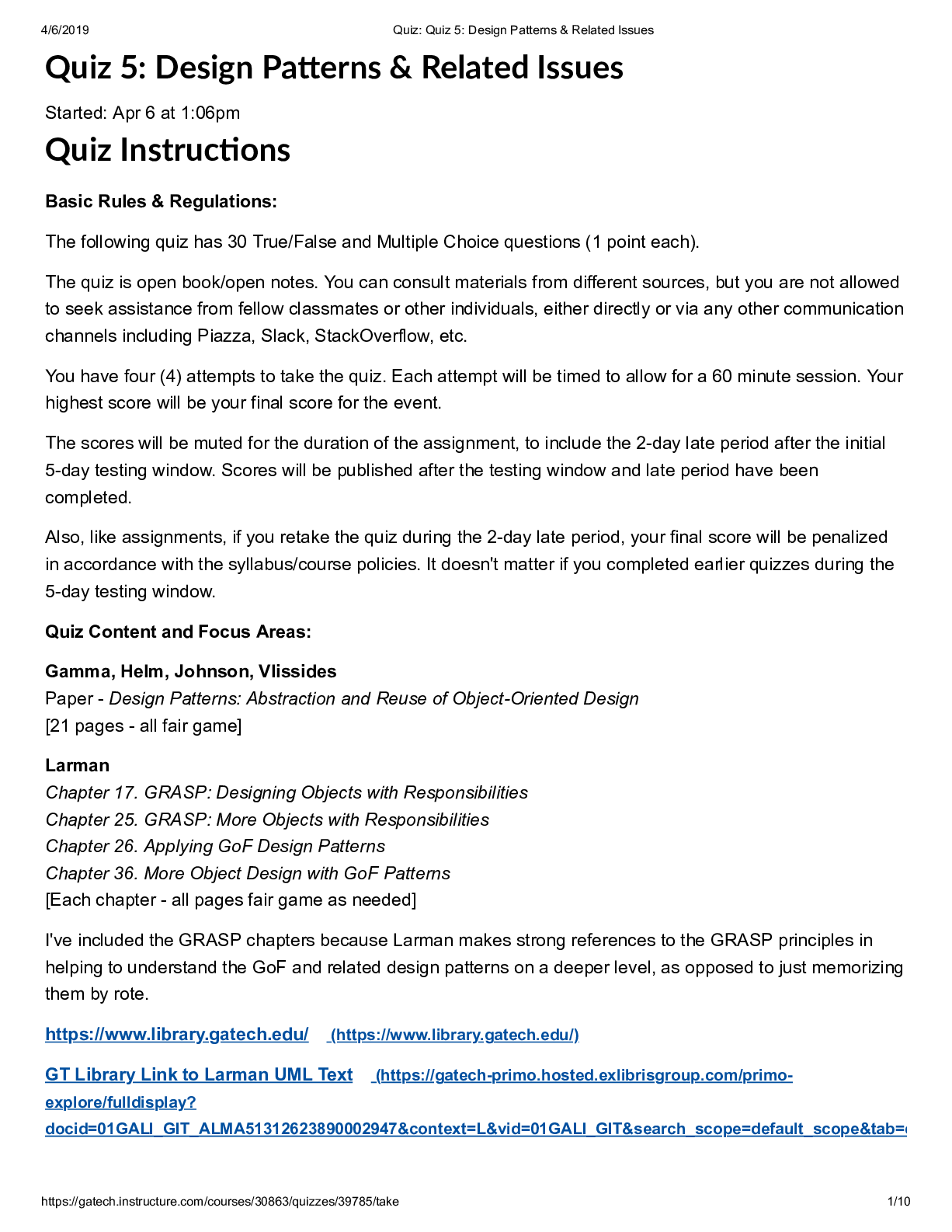
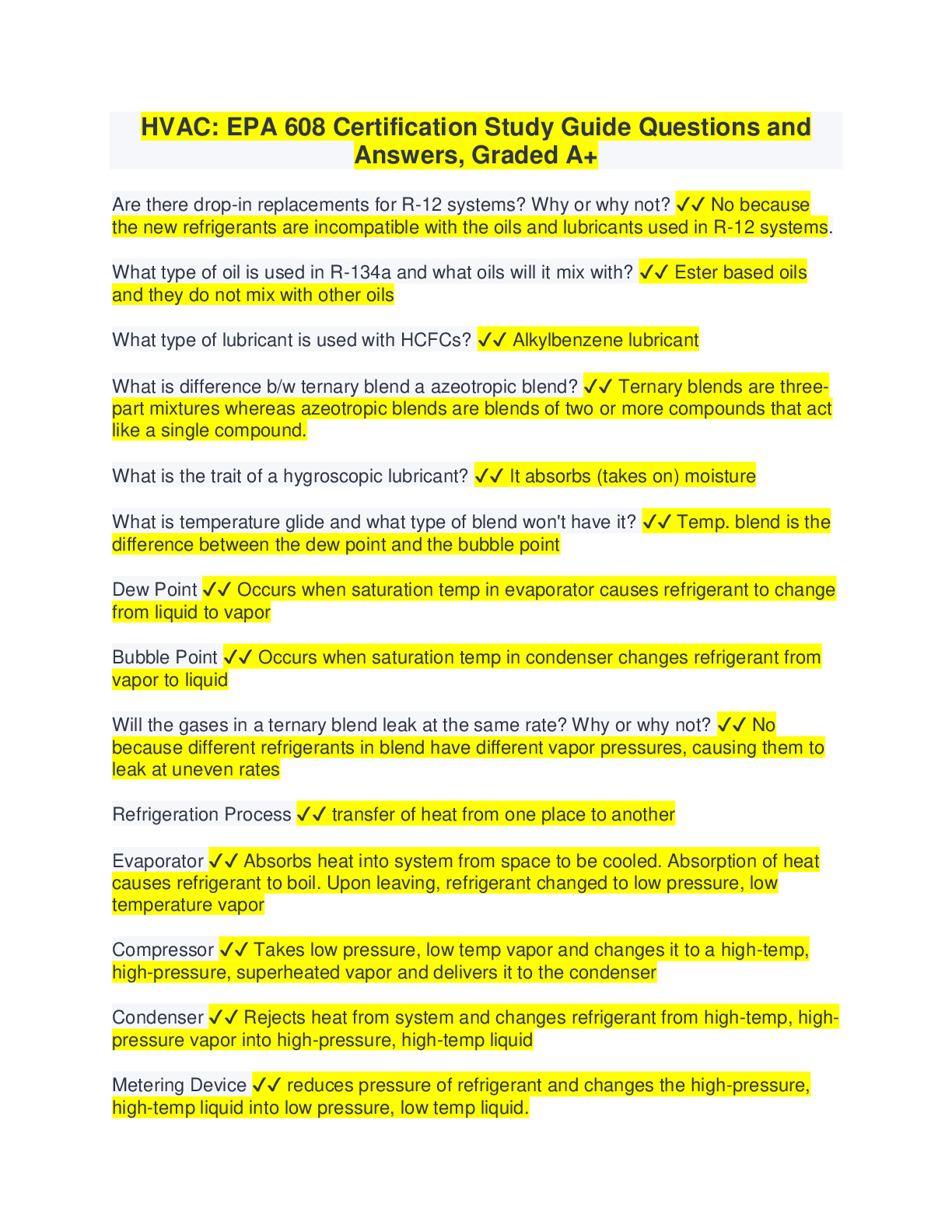
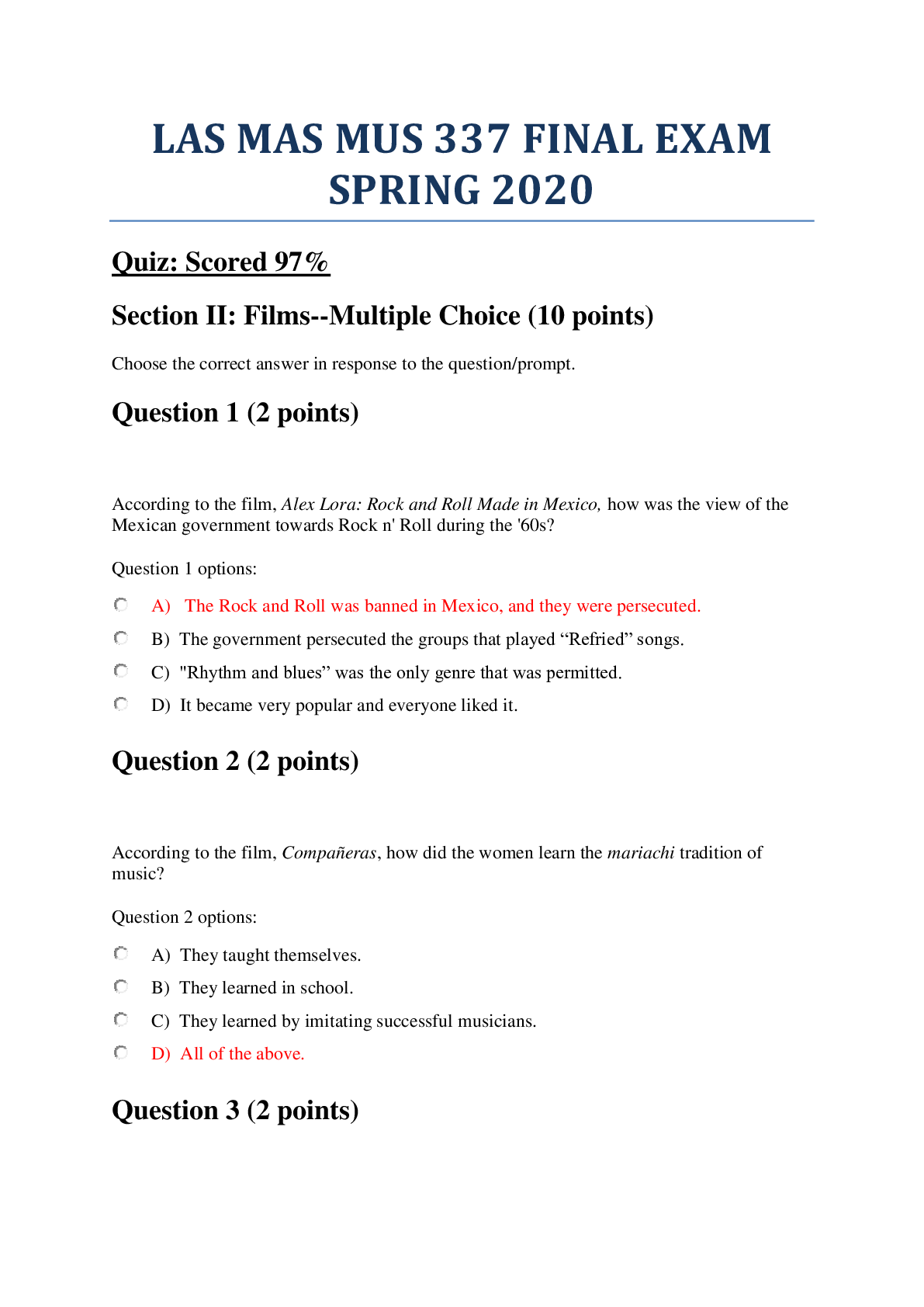
.png)
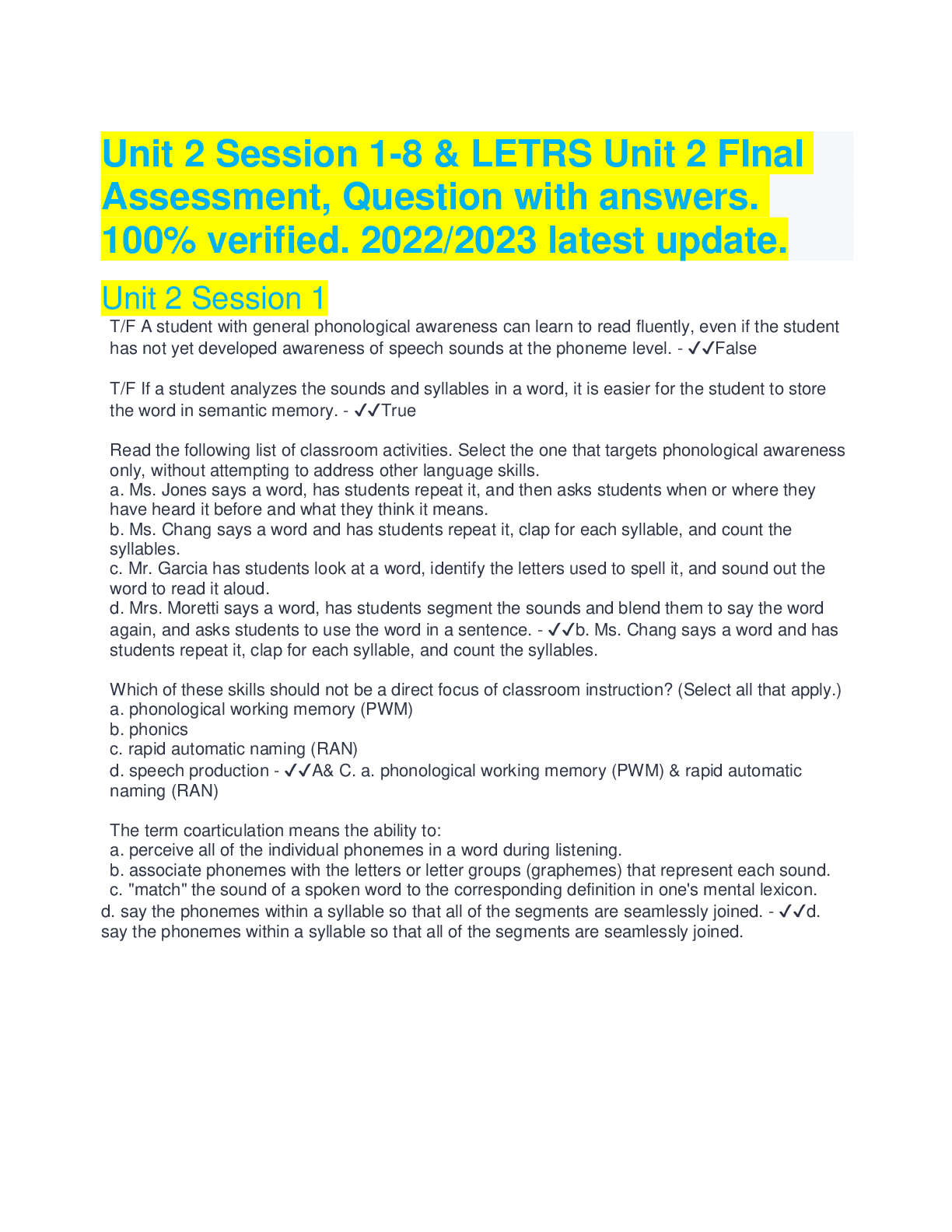
.png)
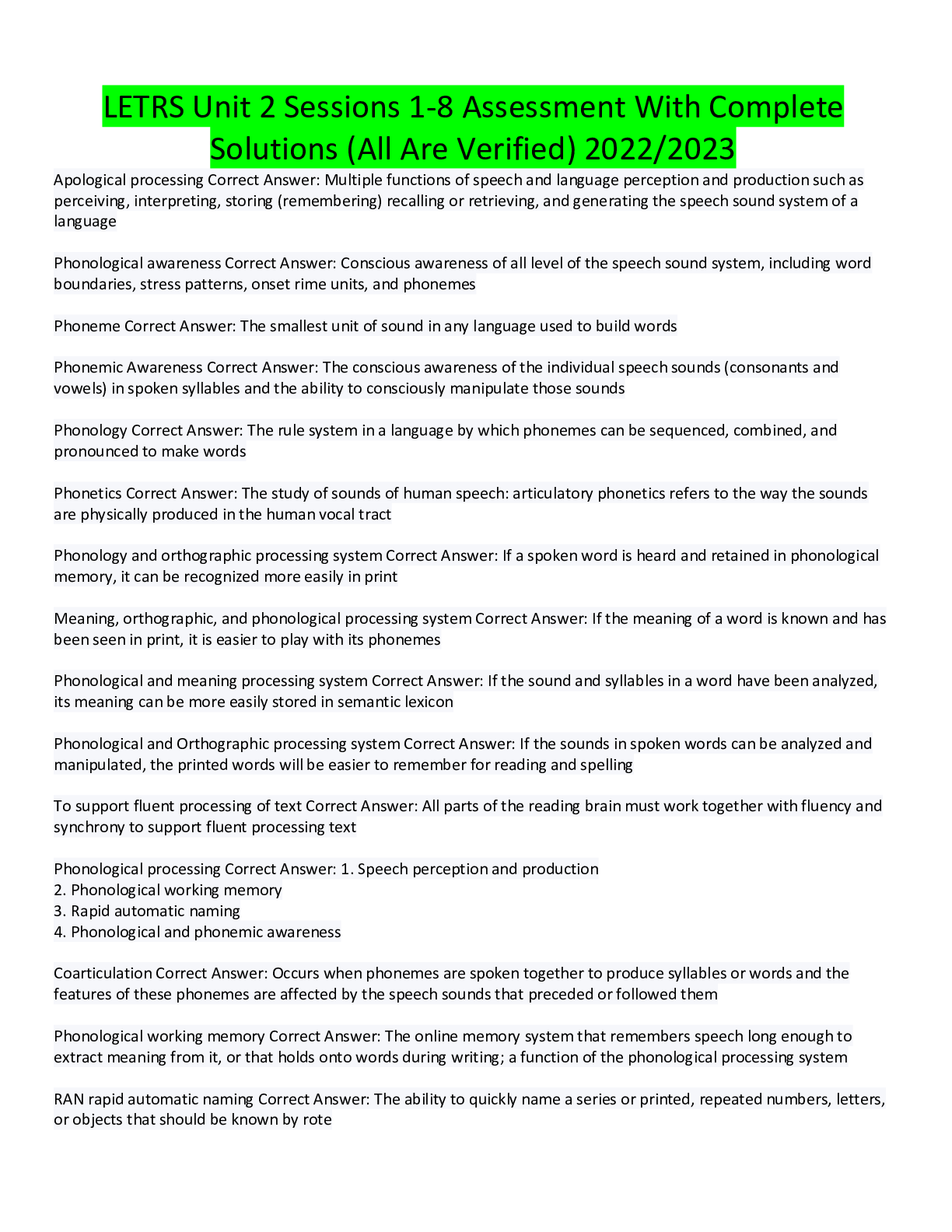
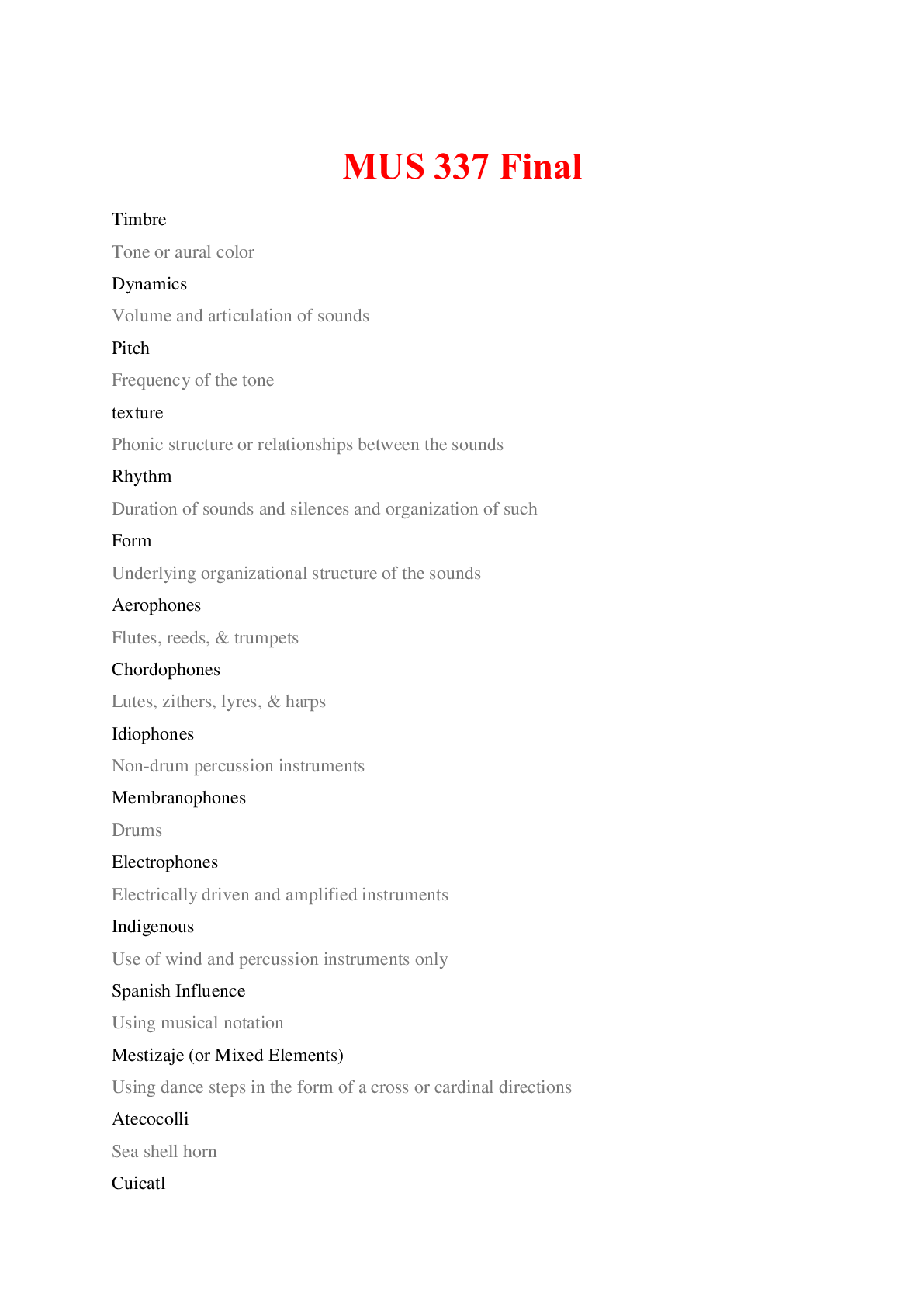
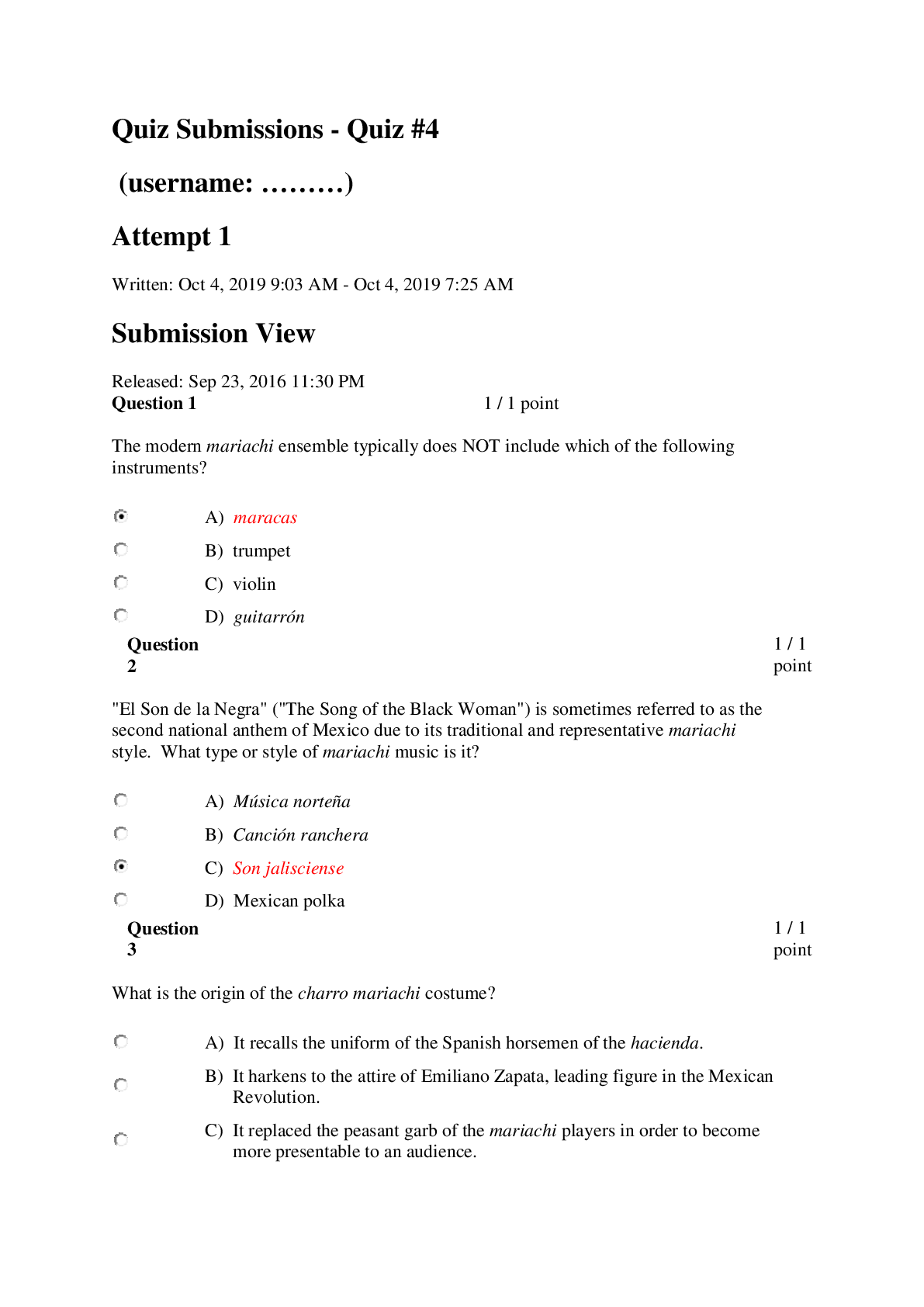
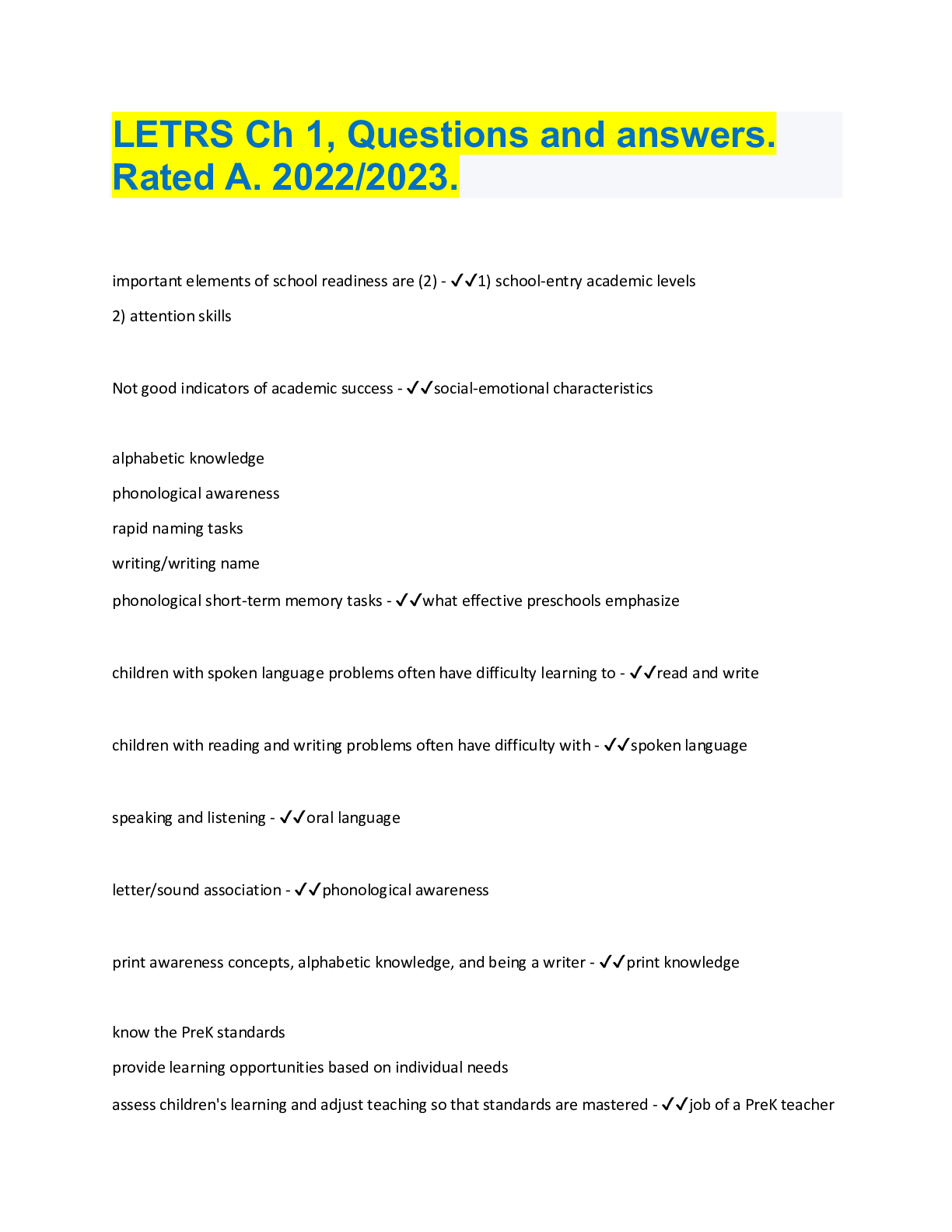
.png)
.png)
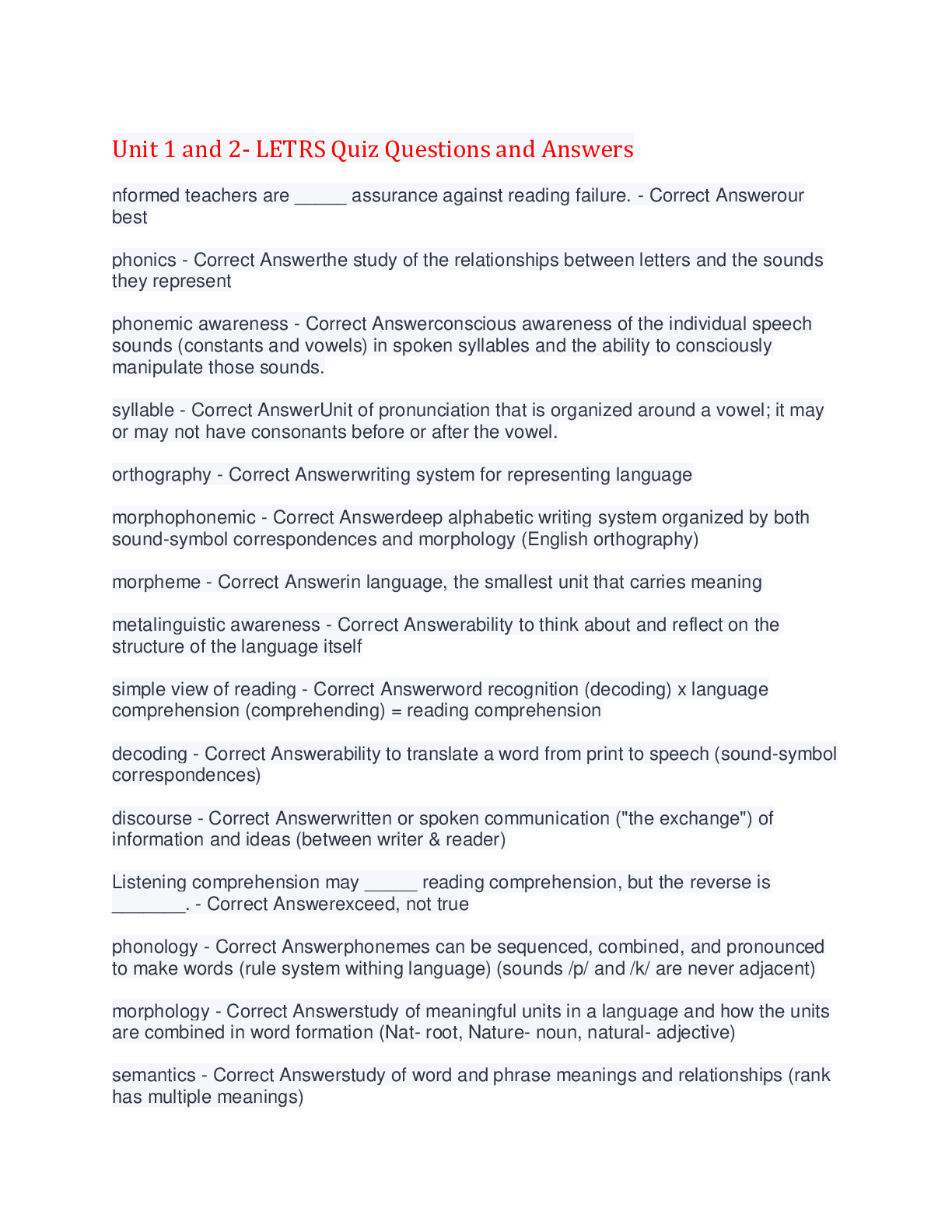
.png)

